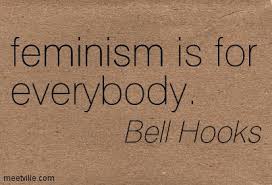Is feminism anti-science?
April 11th, 2014 | Published in Gender; Sexuality
I first wrote about the tension between feminism and science some years ago, after a conference dinner at which the person next to me asked what sort of psychologist I was – probably expecting to hear about my ‘specialty’. My response, no doubt naive, was to describe myself as a feminist psychologist.
 The effect could not have been more dramatic had I been trying: one person left the table; another turned away; another puffed up and demanded to know if that meant I wanted to exclude men; and one responded to the former by explaining that being a feminist meant being anti-science.
The effect could not have been more dramatic had I been trying: one person left the table; another turned away; another puffed up and demanded to know if that meant I wanted to exclude men; and one responded to the former by explaining that being a feminist meant being anti-science.
I felt I should at least attempt to address that.
Monopolisation of knowledge
Feminism, in my understanding, is not inherently anti-science, but does reject the monopoly on knowledge that science can assume. Other forms of knowledge – lived experience and introspection, for example – have low credibility within a scientific worldview.
If the scientific method fails to provide answers to questions (such as how most effectively to intervene in heroin addiction) the failure is seen to lie in application of the method rather than in its inherent limits when trying to understand complex human behavior chains.
Obsession with measurement
Limitations on the way knowledge is constructed also mean that some concepts fall outside the know-able. I was taught, pretty much, that if it can’t be measured, it doesn’t exist, or at least should be ignored.
Ignor-ance, and obsession with measurement are not, however, adequate when it comes to key feminist concepts such as power relations, oppression, and exploitation, which do not yield readily to scientific measurement, but which nonetheless exist.
Mastery and control
Additionally, feminism is sceptical of values that can underlie scientific work.
The language is indicative: causal connections are discovered; variables are controlled; the environment is mastered; treatments are delivered to naive subjects in randomised double-blind experiments.
The framework of control, questionable as research method, becomes anathema when extrapolated to social relations.
Ideology masquerading as science
A potential effect of unexamined values is that ideology can masquerade as science. Over the decades psychology has, for example, invested much effort into research on concepts such as maternal deprivation, self-defeating personality disorder, and late luteal phase dysphoric disorder, all of which pathologise women and decontextualise their lived experience in male-dominated societies.
Indeed, from a feminist perspective, much of psychology supports and perpetuates the status quo of structural power relations, but pays no heed, and evades accountability for damage caused by claiming to be objective, value-neutral, and apolitical.
Pseudoscience
Feminism, as I understand it, also rejects pseudo-science, so-what science, and science-as-an-end-in-itself, examples of which include most research on sex and gender ‘differences’, experimental research with questionable application to the everyday world, and the kind of counselling research that relates eyeblinks to empathy.
I think the belief is that this sort of busywork establishes scientific credentials, but there are no feminist prizes for its products.
Conclusion
Having said all that, I realise why I cringe when the scientist-practitioner model is uncritically upheld as the ideal for psychology. It is not enough and needs, at least, to be linked with an analysis of the social and political context in which it is applied.
Additional requirements for addressing the tension between feminism and science within psychology include recognising the limits of science, exploring alternative ways of understanding complex concepts, examining value frameworks, and resisting the window-dressing of pseudoscience.
I believe it is (probably) theoretically possible to address these issues and, when appropriate, engage in scientific psychological work that is not anti-feminist.
You are warmly invited to leave your comments…Joan Beckwith.




Aside from the fact that there is no psychological reality to the term “feminist psychologist” one is troubled to see this.
“Feminism, as I understand it, also rejects pseudo-science, so-what science, and science-as-an-end-in-itself, examples of which include most research on sex and gender ‘differences’.”
Asserted, not supported with valid sources in scientific journals showing such. The converse is true as any perusal of the literature will show you.
The term “feminist psychologist” is certainly fraught, John McCann, and I have written about the tensions as I have experienced them in another post on this website (link following). Both of these posts are personal opinion pieces, not intended as scholarly articles. As you note, there are no cited references.
I am unclear what aspect of the extract you quote you think I should support with “valid sources in scientific journals”, and hence what you consider is “true as any perusal of the literature will show”.
I am actually surprised that this post has come to your attention (or anyone’s) at this stage. It is quite old (in website terms) and even older in terms of when it was originally written. Both feminism and psychology are diverse enterprises, and I am not attempting to assert any universal truths about either.
https://www.2020socialjustice.com/2014/11/internal-conflicts-of-a-feminist-family-member-and-person-has-been-academic-psychologist-and-counsellor-reinvented-as-blogger-for-social-justice/
Hi Joan,
I think what John was trying to say is that there is plenty of evidence to support the assertion that there is a distinction between male nature and female nature, that the differences between men and women are not just physical.
I would have hoped that in this post-modern age of “knowledges” and “truths” empirical science could be humble enough, or more to the point, realistic enough to recognise the validity and contribution of lived experience and introspection, and I would add rational belief. These operate in an area largely outside the measurable, and are often unreachable by it. Feminism, which to me at least is nothing if it’s not the fight for a fairer world using both heart and mind is what I would call intuitional science, encompassing, but not limited to the world of empiricism.
Many thanks for this comment, George, which pretty much sums up the key points. Feminist theory, for me, has been about a route in to understanding social context and power relations and hence seems essential to understanding human behavior. I see value in both knowledges (empirical psychological together with its methods, AND feminist/social theory). Integrating them is forever a work-in-progress…Joan Beckwith.